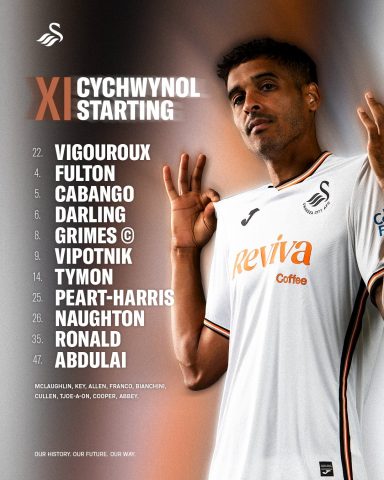It’s June 2019 and Swansea City once again find themselves having to announce a new manager to their expectant public. Within weeks of the Championship season concluding Graeme Potter had left The Liberty after a reasonable season at the helm to move on to Premier League Brighton. Okay, Swansea City received due compensation and Potter had utilised his position as Swansea manager to show the Premier League just what he was all about. He took that chance with both hands. Who can blame him ?
Swansea supporters were admittedly upset, but in the main not surprised, Potter had some serious credentials prior to moving to Swansea, but what now ? After a first season out of the Premier League in years the swans had shown some character, not only on the pitch but off it as well. Players who seemed to suit Potters style were brought in and the next season was surely to be a success ? All this whilst the administration side of the club pulled out every card they had to stop the very real threat of the club going under. Finance was crucial.
So where do you go and where do you look when your treasure is lost to yet another pirate ship ?
The list of candidates were hailed as ‘uninspiring’ by the Welsh media, Michael Appleton, Gabriel Batistuta, Cameron Toshack, Mike Flynn were all included in that uninspiring list. Okay it didn’t fill many with masses of pleasure, but of course Swansea had an idea. In new Chairman and Simon Jordan confidante Trevor Birch the club had a man who had experience in appointing people in numerous industries, especially football, someone who could use a matrix system of scoring candidates using the football knowledge of Leon Britton and new football recruiting officer, Andy Scott.
Birch seemed to relish the challenge.
 Presentations, the written word, teaching methodology, communication and proven coaching ideas regards development of all players – including illustrations of how that candidate had learned from their own experience in this field and management of young people were sought. So, incorporating highly pressurised football situations were these five key factors. And by then the candidate hadn’t even come close to the end of their sales pitch. A series of questions were asked of all candidates who had managed to get through the initial processes. All the same, nothing different for each one, and then more probing football questions by Birch’s experienced football playing and recruiting aides. Then by way of eliminating the candidates by score they had their man. Easy, it’s an industry standard.
Presentations, the written word, teaching methodology, communication and proven coaching ideas regards development of all players – including illustrations of how that candidate had learned from their own experience in this field and management of young people were sought. So, incorporating highly pressurised football situations were these five key factors. And by then the candidate hadn’t even come close to the end of their sales pitch. A series of questions were asked of all candidates who had managed to get through the initial processes. All the same, nothing different for each one, and then more probing football questions by Birch’s experienced football playing and recruiting aides. Then by way of eliminating the candidates by score they had their man. Easy, it’s an industry standard.
In football new ideas and structures are fought against continuously, it’s what holds it back at times but this small team had leadership at least. They also had made a very brave decision.
However, let’s pause, many candidates who made the paper sift were experienced coaches and managers, they could easily show their successes and in most cases failures at professional levels. Their CV’s were littered with brief periods of employment or told the tale they were now in their twilight years, their ideas none too fresh, their enthusiasm not shining through. Out of all the candidates one man did shine, a young man called Steve Cooper who could show how he had progressed through junior football to a brief spell in the Welsh leagues to a carefully thought out coaching apprenticeship that started in 1998 at Wrexham. He would then move on to Liverpool as youth coach again through the academy age groups and then on to England. His development carefully documented, cited by the most respected names in the game, and had personal involvement in the development of Raheem Sterling, Phil Foden, Ben Woodburn, Trent Alexander-Arnold and Callum Hudson-Odoi just to name a few. Having worked with Barcelona coach, the respected José Segura in a variety of coaching methods Cooper was focussed. A team has to get the ball back as quickly as possible when not in possession, but doing it with structure and formation his sides were ready to build ball retention – moving forwards as an attacking force he most certainly impressed. His ability to verbalise his coaching methodology and display that through the teams he had coached, and then impressively leading England Under 17 to a World Cup win couldn’t be ignored.
 The Swansea interview panel had before them someone who was fresh, who had the ability to manage young players, understanding how young people at the top of their game, for their age, reacted and developed. And of course he was fully qualified. Cooper was an all badged up football coach who had eleven years of relative success behind him. At thirty nine, Steve Cooper had his first professional coaching and management role at a club who only five years before had turned the heads of many a football fan worldwide with their football style and European success. You can throw in a major trophy too, Cooper had landed the biggest job in Welsh club football.
The Swansea interview panel had before them someone who was fresh, who had the ability to manage young players, understanding how young people at the top of their game, for their age, reacted and developed. And of course he was fully qualified. Cooper was an all badged up football coach who had eleven years of relative success behind him. At thirty nine, Steve Cooper had his first professional coaching and management role at a club who only five years before had turned the heads of many a football fan worldwide with their football style and European success. You can throw in a major trophy too, Cooper had landed the biggest job in Welsh club football.
Albeit at youth levels he had a sixty six percent win rate, failure at these percentages is clearly not an issue. Coopers non negotiable requirements, now cited regularly were very evident. He was now at a club that had a decent track record of development through its academy, who had produced premier league players via astute purchases and polished them carefully in reserve and Under 21/23 teams. He had an opportunity to introduce his much talked about 4-2-3-1 formation with holding midfielders and attacking wing backs which worked so well with England. Cooper is a student of defensive formations which can be adopted in play, not unlike Graeme Potter but with more structure, which had seen some success over the past year at Swansea. Now we are seeing 3-5-2 or even 5-3-2 structures, returning wins when the game seemed lost. Of course as a young manager now in the Championship melting pot he would and always will face criticism when these strategies fail, and they do, in fact they have. The style is frustrating at times, especially with players who do not have the ability to either understand or implement a sudden change of formation. Norwegian U21 international Bersant Celina would be a prime example, a player rich in talent who via the Norwegian system with its freestyle coaching methods simply could not carry out the managers wishes. It got him recognised by Kosovo and led to a transfer to Swansea but his overall attitude saw him having less and less game time. For many Swans supporters this was not best for the team, such a talented player not getting game time, however after the lockdown many would say he wasn’t missed as Swansea City hit the play offs. The post lockdown matches, at times were enthralling encounters, bar one or two mishaps especially against Luton at home but at last the clubs supporters could see where Cooper was coming from.
Steve Cooper is a manager right at the start of his second season in top flight football, he has a vision that will not always be agreed with, and a style of play which will always have its question marks, especially by those who want immediate results with little learning. Think Sam Allardyce. That’s not Coopers way, he has managed at this point to gain the respect of the players, that is not in doubt, he has in Wayne Routledge an advocate of his style of play and for such an influential senior player to support him that’s pure gold. This season may well throw up many frustrations, much as they did after the 1-0 win at Preston last weekend. However in Steve Cooper Swansea City have a committed manager, someone who knows exactly what he wants from his players, and more importantly how to achieve it. In Mike Marsh he has an assistant who reinforces this philosophy and again someone who has achieved much in the game. The ingredients are all there for a successful second season at Swansea for Steve Cooper, it may require some patience and it will be frustrating. However, unlike Potter, Cooper didn’t jump on the first ship out of Swansea Bay, he continued his work, he continues to work, and it could well be his commitment to Swansea and the club just may well pay dividends.
Keith Haynes has written numerous books on Welsh football and worked on many articles and publications including 442, World Soccer and Mirror
You can follow Keith on twitter @_KeithHaynes
You can buy any of Keith’s books via Amazon and his author page which you can visit here







Keith, could you please start writing on the mighty Bluebirds as well.
Great article
Excellent article and my thoughts exactly. I’m happy to see him take us into a second season. He’s achieved a lot with very little.